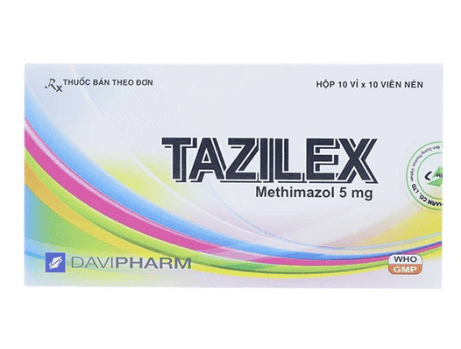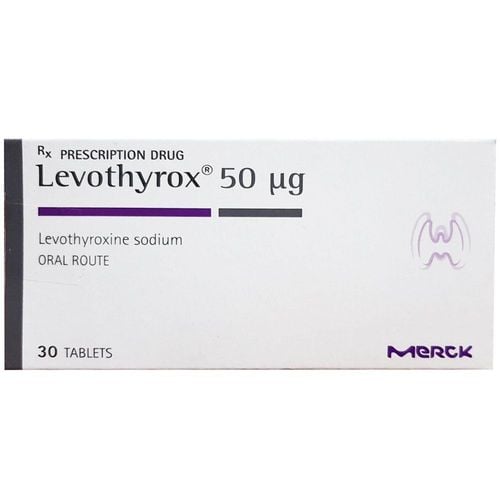This is an automatically translated article.
Rieserstat is a drug that treats hyperthyroidism and reduces hyperthyroidism in preparation for complete thyroid surgery or radioactive iodine therapy. Rieserstat is a prescription drug, and patients must absolutely not use it without a prescription and prescription from a doctor.
1. What is Rieserstat?
Rieserstat belongs to the group of hormonal drugs - hormones, is made in the form of tablets, packing specification box of 1 bottle of 100 tablets. The active ingredient in Rieserstat is Propylthiouracil 50mg.
Propylthiouracil is a drug that works to prevent the formation of thyroid hormone by minimizing the oxidation process to create free iodine, thereby limiting the binding of iodine molecules and precursors of thyroid hormones. In addition, Propylthiouracil also inhibits the conversion of T4 to T3 outside the thyroid gland.
2. Indications for taking Rieserstat
Rieserstat is indicated in the following cases:
Treatment of hyperthyroidism. Reduces hyperthyroidism in preparation for complete thyroid surgery or radioactive iodine treatment.
3. Dosage, how to use Rieserstat
Rieserstat should only be used under the prescription of a physician. The reference dose of Rieserstat is as follows:
The total daily adult dose is usually given in 3 divided doses every 8 hours:
The starting dose is Rieserstat 300mg daily. Patients with severe hyperthyroidism, large goiter, or both should increase the initial dose to 400 mg daily, some patients responding to an initial dose of 600-900 mg. The daily maintenance dose of Rieserstat is 100 - 150 mg. Pediatric Dose:
Children 10 to 14 years of age: The starting dose of Rieserstat is 150-300mg for 24 hours in 3 or 4 divided doses. Children 6 to 9 years of age: The starting dose of Rieserstat is 50 -150mg for 24 hours in 3 or 4 divided doses. The maintenance dose of Rieserstat should be determined according to the patient's response. Pregnant women:
The starting dose of Rieserstat is 150-300mg for 24 hours, divided into 3 or 4 times. The maintenance dose of Rieserstat should be determined according to the patient's response. Note: The above dose of Rieserstat is for reference only. The specific dose of Rieserstat will depend on your condition and disease progression. To get the right dose of Rieserstat, patients need to consult their doctor/pharmacist.
4. Contraindications to the use of Rieserstat
Hypersensitivity to the components and excipients of Rieserstat; For lactating women: Rieserstat is excreted in breast milk and causes undesirable effects in infants, so it is contraindicated in lactating women. Contraindication is understood to be contraindication. absolute indication, this means that for any reason the contraindication should not be flexible to use Rieserstat.
5. Drug interactions
The following are some drugs that may interact with Rieserstat:
Concomitant use of Rieserstat with anticoagulants will increase the anticoagulant effect. Concomitant use of Rieserstat with anti-neoplastic agents or chloramphenicol increases the risk of bone marrow depression. Alcohol should not be consumed while taking Rieserstat because it can increase liver toxicity. You should not smoke while taking Rieserstat because it can increase the heart rate. To avoid unwanted interactions when using Rieserstat, patients should inform their doctor/pharmacist of all medicines, dietary supplements, vitamins and herbs... they are taking.
6. Side effects of Rieserstat
Some side effects may occur when using Rieserstat such as:
Headache; Dizzy; Peripheral nerve disorders. Some patients have nausea, vomiting, diarrhea, loss of appetite. Loss of granulocytes. In case the patient has fever, fatigue and sore throat, it is necessary to stop taking Rieserstat and conduct a white blood cell test. If there are signs of agranulocytosis, appropriate treatment should be instituted. When leukopenia, hypoprothrombinemia, purpura, aplastic anemia, coagulation factor VII deficiency, Rieserstat should be used. Skin side effects such as hair loss, skin pigmentation disorder, itching and rash; Liver disorders, jaundice rarely occur, but if encountered, the drug should be discontinued; Hypersensitivity reactions such as rash, itching, shock. If symptoms are mild, it can be used concurrently with antihistamines, continuing to closely monitor the patient. In severe cases, Rieserstat should be discontinued. Lupus-like syndrome including symptoms such as fever, erythema, muscle/joint pain, lymphadenitis, splenomegaly,... are rare. If you experience this side effect, stop taking the drug. Other undesirable effects such as fatigue, lymphadenitis, muscle/joint pain, salivary gland enlargement, edema, loss of taste. Inform the treating doctor/pharmacist if there are any suspicious symptoms caused by the use of Rieserstat for timely treatment.
7. Note the use and storage of Rieserstat7. Notes on use and storage of Rieserstat
Note when using Rieserstat:
It is necessary to regularly monitor people who are being treated for symptoms of agranulocytosis, immediately go to a medical facility if there are signs of infection, sore throat, rash. lumps on the skin, the whole body is uncomfortable. Side effects of agranulocytosis will increase with the age of the patient, so caution should be exercised when appointing treatment to people over 40 years old. People with liver disease can cause serious adverse reactions when taking Rieserstat. For pregnant women, Rieserstat can cross the placental barrier, causing toxicity to the fetus. Therefore, if treatment is to be used, the dose must be adequate, not too high. Storing Rieserstat: Store the drug in a cool, dry place (below 15 degrees); Avoid exposure to light; Keep out of reach of children and pets. Above is information about uses, dosage and precautions when using Rieserstat. Note, Rieserstat is a prescription drug, so patients should not use it on their own, but need to contact a specialist directly for a suitable prescription to ensure safety for health.













